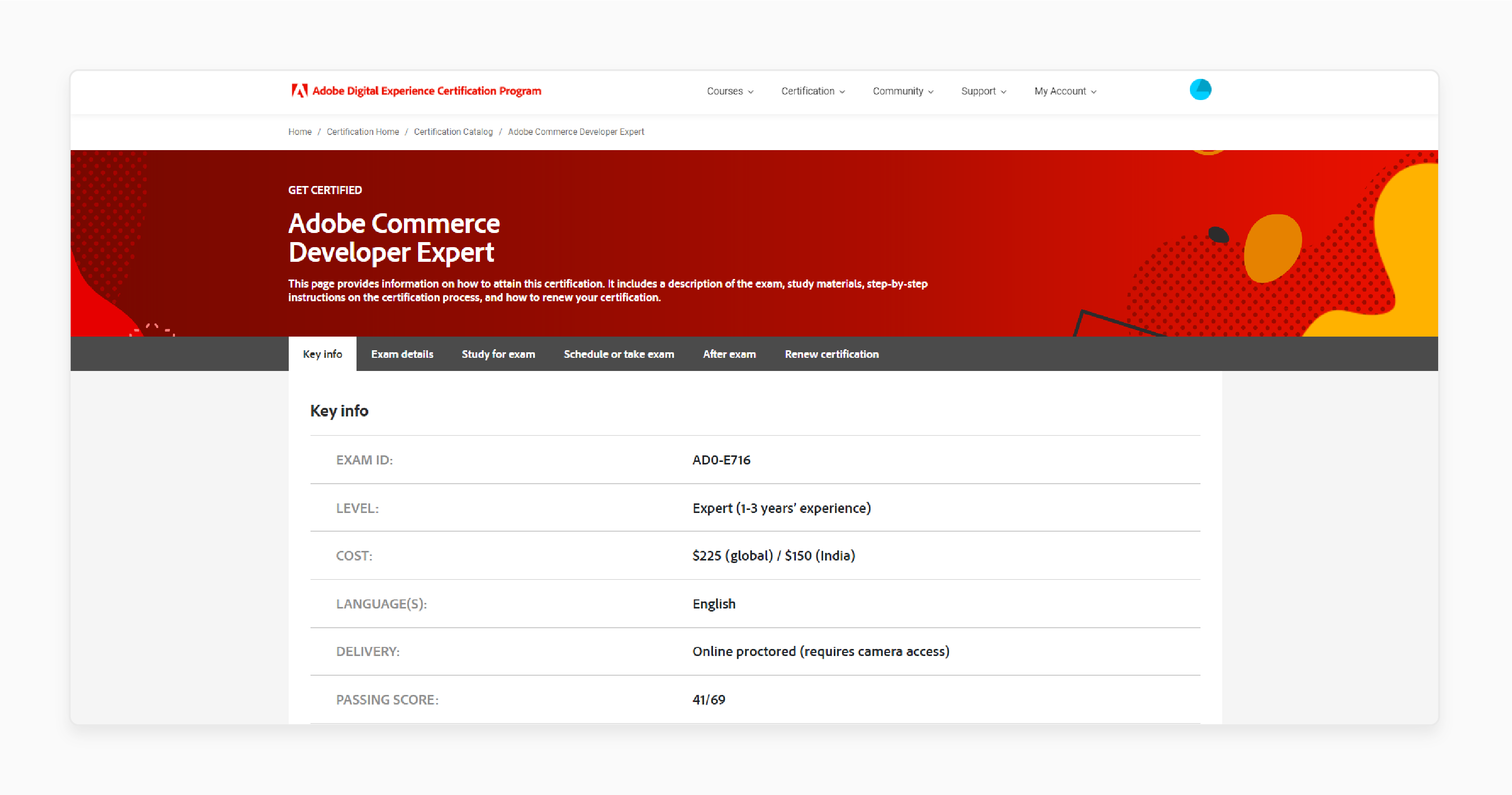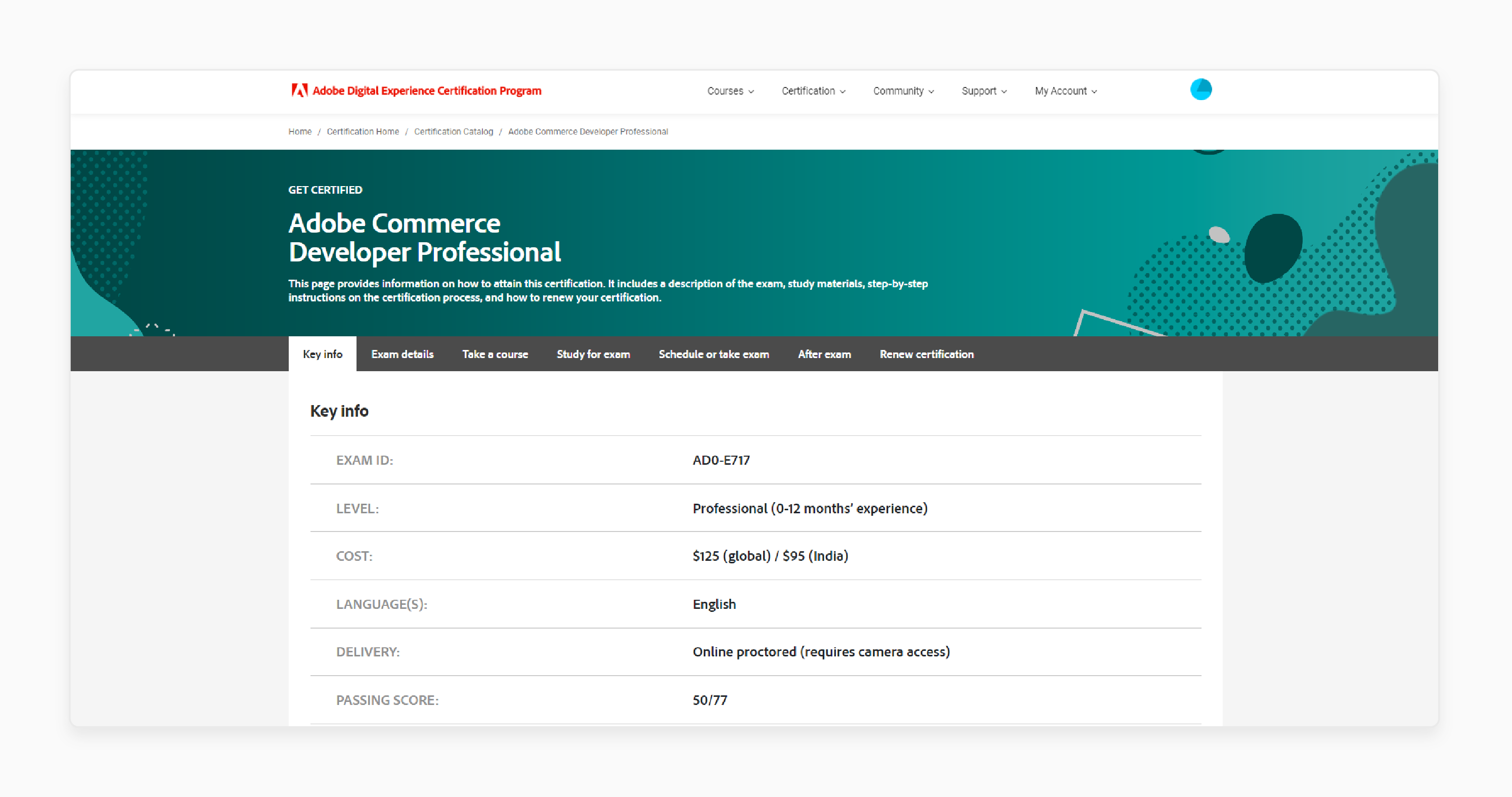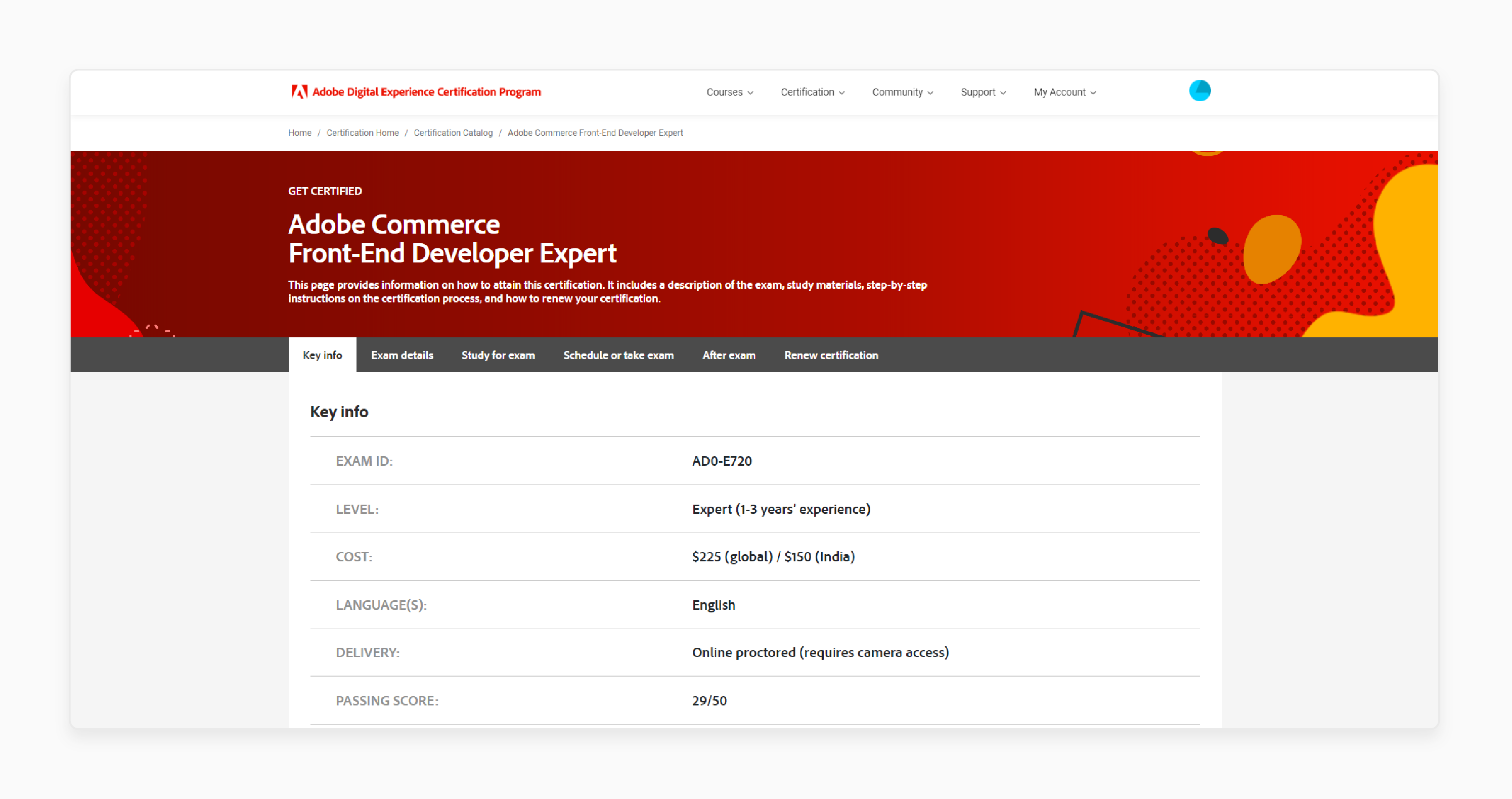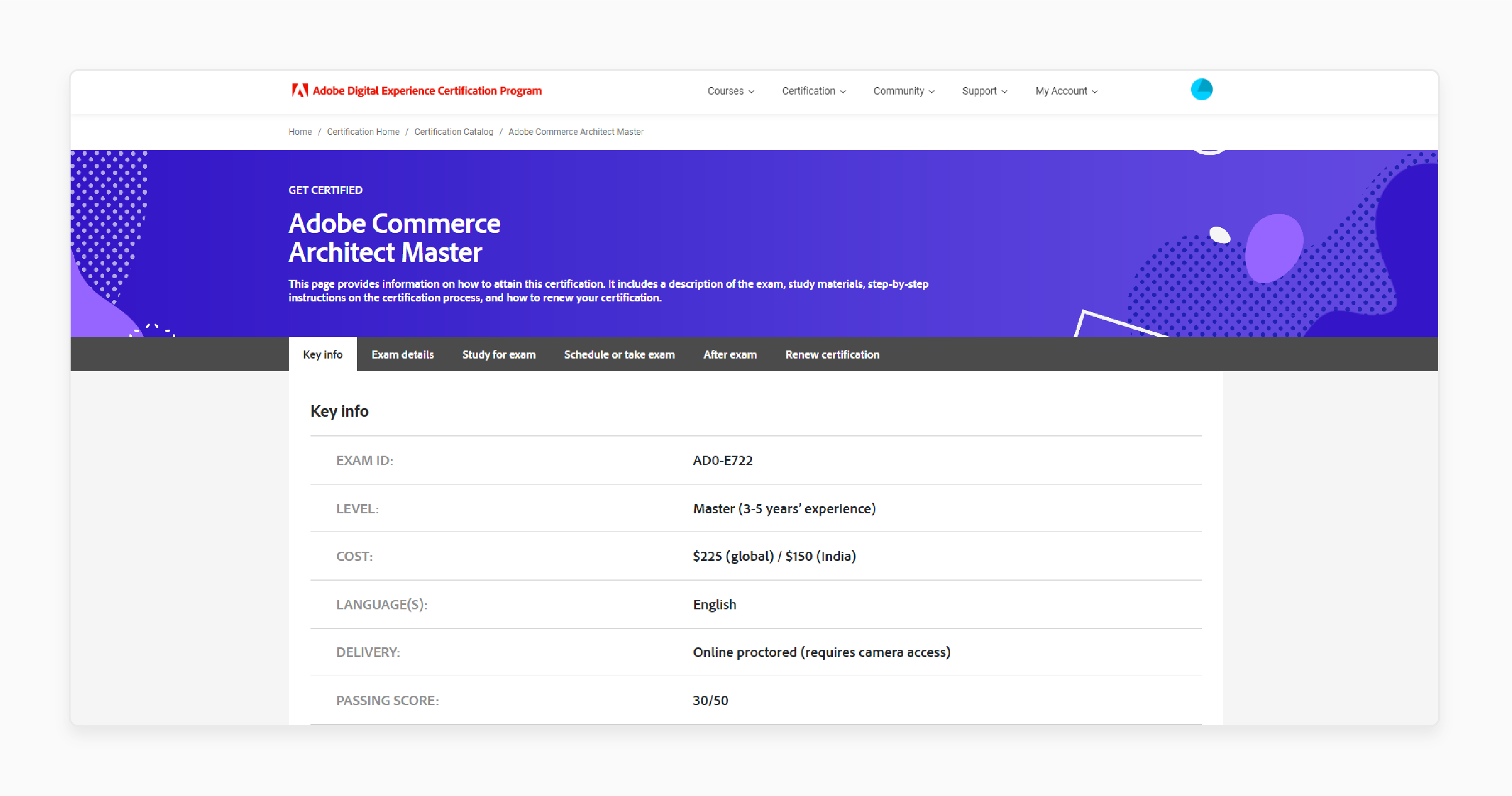
Guide to Magento 2 Developer Training: Career Path Explained
Want to master the most powerful e-commerce platform?
Adobe Commerce (formerly Magento) powers over 250,000 online stores worldwide. Professional Magento 2 developer training equips you with essential skills for success.
In this article, we’ll cover comprehensive training pathways and certifications to become a Magento 2 developer.
Key Takeaways
- Magento 2 developer training maps out a clear career path for growth.
- Master essential Adobe certifications to validate your expertise.
- Key tools like PHPStorm, Docker, and Git enhance development efficiency.
- Continuous learning and project experience speed up skill mastery.
- Salaries for Magento 2 developers increase significantly with experience.
-
How Long Does It Take to Complete Magento 2 Developer Training?
-
Top Adobe Certifications Required for Magento 2 Developer Training
How Long Does It Take to Complete Magento 2 Developer Training?
"The typical timeline for becoming a proficient Magento 2 developer spans 6-12 months. The duration varies based on your prior experience with PHP and e-commerce platforms."
Beginners should dedicate 3-4 months to core concepts and fundamentals. Advanced topics require another 4-6 months of focused practice. Real-world project experience adds 2-3 months to the learning curve.
Regular code practice accelerates the learning process considerably.
Detailed Career Path Progression for Magento 2 Developers
| Career Stage | Years | Core Skills | Projects | Growth Areas |
|---|---|---|---|---|
| Trainee | 0-1 | Basic PHP, HTML/CSS, jQuery | Theme customization, Simple modules | Version control, Coding standards |
| Junior | 1-2 | Module development, API basics | Payment integrations, Custom widgets | Performance optimization, Security |
| Intermediate | 2-4 | Complex modules, Third-party integrations | Multi-store setup, B2B features | Architecture patterns, Cloud deployment |
| Senior | 4-6 | System architecture, Team leadership | Enterprise solutions, Platform migration | Scalability, High-availability systems |
| Lead | 6-8 | Technical direction, Solution design | Global rollouts, Custom platforms | Innovation, Strategic planning |
| Architect | 8+ | Enterprise architecture, Technical strategy | Multi-brand solutions, Platform evolution | Digital transformation, Future-ready solutions |
Top Adobe Certifications Required for Magento 2 Developer Training
1. AD0-E716 Adobe Commerce Developer Expert

Adobe Commerce Developer Expert is an expert-level certification. It is aimed at developers and technical leaders with 1-3 years of Adobe Commerce experience. The exam is available globally. It costs $225 ($150 in India). It is administered online, requiring camera access.
Sections and Weighting
The test covers Adobe Commerce customization (36%). It includes database and EAV model (10%). Catalog and sales customization is 12%. API and services take 4%. Adobe Commerce Cloud setup and CLI are 22%.
Additional Details:
-
Skills Focus: The test assesses knowledge of Adobe Commerce architecture. Key areas include cache management, database structure, EAV, dependency injection, and API development. Another focus point is CLI command creation. Theme customization and page builder usage are important. Adobe's security features are also tested.
-
Technical Areas: The exam requires familiarity with PHP, Redis, Elasticsearch, SQL, Varnish, and Git. Knowledge of Adobe's cloud architecture tools is essential. Knowledge of Commerce Cloud features is essential. Candidates must know multi-domain setup. They must also know deployment processes.
-
Intended Audience: The exam is suited for developers and backend specialists. It is for lead developers and solution architects. It confirms expertise in advanced Adobe Commerce configurations. It validates knowledge in cloud implementations.
-
Passing Score and Time: Candidates must answer 69 questions within 2 hours and 18 minutes. They must achieve a minimum score of 41 to pass.
2. AD0-E717 Adobe Commerce Developer Professional

Adobe Commerce Developer Professional is a professional-level exam for developers. It requires up to one year of Adobe Commerce experience. It costs $125 (or $95 in India). It is conducted online with camera access. Candidates must complete 77 questions in 2 hours and 34 minutes. The passing score is 50.
Sections and Weighting
The exam emphasizes architecture (29%). EAV/database handling is 13%. Layout/UI is 15%. Other sections cover catalog and checkout. Adobe Commerce Cloud setup is included. Commerce Cloud CLI tools are tested
Additional Details:
-
Skills Focused: The exam covers foundational skills in Adobe Commerce. It includes admin development, EAV database, and layout/UI. Checkout, sales, and catalog setup are included. Candidates need familiarity with PHP, and MySQL. They should know object-oriented programming and cloud architecture.
-
Technical Scope: Topics include Adobe Commerce's architecture and CLI commands. Cron jobs, module structure, and dependency injection are covered. Caching, stores, and cloud architecture are important. Key areas involve database schema manipulation. Catalog and price customization are tested. Configuration of payment methods is included.
-
Intended Audience: The certification is for entry-level developers. It suits lead developers and backend specialists. Solution architects can benefit from it. It validates foundational knowledge across Adobe Commerce. It prepares candidates for advanced certifications.
-
Preparation Guide: Adobe's official certification guide offers resources. It includes study materials and exam objectives. These help candidates align their study focus.
3. AD0-E720 Adobe Commerce Front-End Developer Expert

Adobe Commerce Front-End Developer Expert is an expert-level certification. It requires 1-3 years of Adobe Commerce experience. The cost is $225 globally ($150 in India). The online exam is proctored with camera access. Candidates must answer 50 questions in 1 hour and 40 minutes. A score of 29 is needed to pass.
Sections and Weighting
Exam topics include theme management (16%). Layout XML and templates are 22%. Styles take 18%. JavaScript is 22%. Admin configuration is 12%. CLI/Grunt tools are 10%.
Additional Details:
-
Skills Assessed: The exam evaluates theme management and layout XML. It tests CSS, JavaScript, and admin configuration. Familiarity with CLI commands is required. Knowledge of Grunt, caching, and responsive design is tested.
-
Technical Focus: Key areas include Adobe Commerce's theme hierarchy. Layout customization is important. Styling via LESS is covered. Candidates must understand JavaScript libraries. Knowledge of HTML and CSS preprocessors is required. These are used for front-end development.
-
Intended Audience: The certification is for developers and lead developers. Front-end specialists can benefit from it. It confirms the ability in layout customizations. It validates front-end performance optimization skills.
-
Preparation Guide: Adobe's certification guide provides study resources. It covers theme structure and CSS hierarchy. JavaScript preparation is included.
4. AD0-E722 Adobe Commerce Architect Master

Adobe Commerce Architect Master is a master-level certification for architects. It requires 3-5 years of Adobe Commerce experience. The exam costs $225 globally ($150 in India). It is taken online with camera access. Candidates have 1 hour and 40 minutes for 50 questions. The passing score is 30.
Sections and Weighting
Key areas include Design (46%). Review takes 32%. Configure and Deploy is 22%. Each section tests customization skills. Scaling Adobe Commerce is evaluated. Troubleshooting and optimization are assessed.
Additional Details:
-
Skills Assessed: The test evaluates abilities in Adobe Commerce solutions. Key skills include system configuration and database management. Performance optimization and security features are tested. Server integrations are important. Candidates should create detailed blueprints. They must troubleshoot complex environments.
-
Technical Focus: The exam covers Adobe Commerce architecture. Customization and deployment practices are included. Candidates must know GraphQL and AMQP. Knowledge of Composer, Redis, and Varnish is required. Adobe Commerce Services Connector is covered. Coding standards, caching, and indexing are essential.
-
Intended Audience: The certification is for lead software architects. Technical architects can benefit from it. Solution architects and senior backend developers are included. It suits professionals designing complex implementations. It validates leadership in Adobe Commerce projects.
-
Preparation Guide: Adobe's certification guide offers resources. Topics cover Adobe Commerce design. Configuration and deployment practices are included. These align with exam requirements.
Tools to Master for Magento 2 Developer Training
1. Development Environment
-
PHPStorm IDE: Popular IDE for PHP with Magento-specific plugins.
-
Composer Package Manager: Manages Magento dependencies and libraries.
-
Git Version Control: Tracks code changes and enables collaborative development.
-
Docker Containers: Creates consistent development environments across systems.
-
Xdebug for Debugging: Provides step-by-step debugging for error tracing.
2. Testing Tools
-
PHPUnit Framework: Enables unit testing for validating individual code units.
-
Selenium Automation: Automates front-end testing for UI verification.
-
MFTF (Magento Functional Testing Framework): Magento's own tool for functional test automation.
-
Apache JMeter: Performance testing tool for load and stress analysis.
-
Code Quality Tools: Affirms adherence to Magento’s coding standards.
3. Deployment Tools
-
Jenkins CI/CD: Automates build and deployment processes for continuous delivery.
-
AWS/Azure Cloud Services: Provides scalable hosting and infrastructure options.
-
New Relic Monitoring: Monitors application performance and server health.
-
Redis Cache Management: Improves Magento performance through caching.
-
Elasticsearch Implementation: Enhances search capabilities in Magento stores.
Must-Have Additional Skills For a Magento 2 Developer
1. Version Control
-
Git branching strategies: Organize parallel development tasks effectively.
-
Code review: Maintain quality through peer-reviewed code.
-
Conflict resolution: Guarantees smooth workflow by resolving code conflicts.
-
Repository management: Keep repositories structured for easy access.
-
Collaborative workflows: Coordinate team efforts efficiently using Git.
2. Database Management
-
MySQL optimization: Enhance performance by fine-tuning queries.
-
Design patterns: Structure databases for scalability.
-
Indexing: Speed up data retrieval with targeted indexing.
-
Data migration: Enable seamless data transfers between platforms.
3. Security Implementation
-
XSS and SQL injection prevention: Safeguard against common web vulnerabilities.
-
Access control: Secure critical sections of the application.
-
Patch management: Keep systems protected with regular updates.
4. Performance Optimization
-
Cache management: Use caching to reduce load times.
-
Code profiling: Identify and address performance slowdowns.
-
Asset and query optimization: Streamline frontend and backend for faster user experiences.
-
Server setup: Configure for reliable and scalable performance.
5. API Development
-
REST and GraphQL design: Build flexible and efficient APIs.
-
Authentication and rate limiting: Provides security and stability.
-
Documentation: Provide clear instructions for easy API integration.
Estimated Yearwise Salary Growth of a Magento Developer
| Experience | US Market | UK Market | APAC Market | Role Level |
|---|---|---|---|---|
| 0-2 years | $65-80K | £35-45K | $25-35K | Junior Developer |
| 2-4 years | $80-100K | £45-60K | $35-50K | Mid Developer |
| 4-6 years | $100-130K | £60-80K | $50-70K | Senior Developer |
| 6-8 years | $130-160K | £80-100K | $70-90K | Lead Developer |
| 8+ years | $160K+ | £100K+ | $90K+ | Architect |
FAQs
1. How challenging is it for beginners to learn Magento 2 development?
Learning Magento 2 requires dedication and a systematic approach. Start with the basics of Magento and PHP fundamentals. The Magento 2 course structure follows logical progression. Many developers master basic concepts within 3-4 months. Practice tests help reinforce theoretical knowledge effectively.
2. Which certification should I pass to become a Magento certified developer?
Start with the associate developer certification exam. The Magento 2 certified professional developer exam follows next. Adobe Commerce certification builds advanced expertise. Each certification needs 2-3 months of preparation. Practice tests strengthen your knowledge of Magento concepts.
3. How can I use Magento ecommerce platform for online retailers?
Mastering Magento training covers e-commerce website creation fundamentals. Learn how to create custom modules and themes. The course gives hands-on experience with real projects. Development experience comes through building actual online stores.
4. What makes Magento 2 training different from other courses online?
Magento 2 is one of the most loved framework for e-commerce sites. The training is used by thousands of developers worldwide. The course covers both front-end and back-end development. Well explained with appropriate coding examples throughout lessons.
5. How do I achieve certification as a certified professional developer?
Join the thousands pursuing Magento certified expert status. Training and certification programs follow structured learning paths. The course is available with comprehensive study materials. Regular practice tests measure your progress effectively.
6. What aspects of Magento should I focus on first?
Start with Magento concepts and open-source architecture basics. Learn how to use core features effectively. Module creation skills need primary attention. The latest Magento updates require continuous learning commitment.
7. Which best practices help in Magento development course completion?
Focus on solidity and tons of practical coding. Among many e-commerce platforms, Magento needs systematic learning. The course is for developers seeking professional growth. Also get access to community resources and support.
Summary
Magento 2 developer training equips you with essential knowledge about Magento e-commerce development. It’s one of the most lucrative developer pathways in recent times. Here are the key highlights on how to proceed:
-
Start with core PHP and MySQL fundamentals. Strong programming basics aids in faster learning progression.
-
Focus on practical projects during training. Real-world experience accelerates professional growth significantly.
-
Obtain Adobe Commerce certifications strategically. Certifications validate your expertise and increase market value.
-
Master development tools and workflows early. Efficient tooling knowledge improves development productivity.
-
Keep security and performance in focus. These skills differentiate expert developers from average ones.
-
Invest in continuous learning and community engagement. Technology evolves rapidly in the e-commerce space.
Managed Magento hosting services include solutions from only certified Magento developers.








